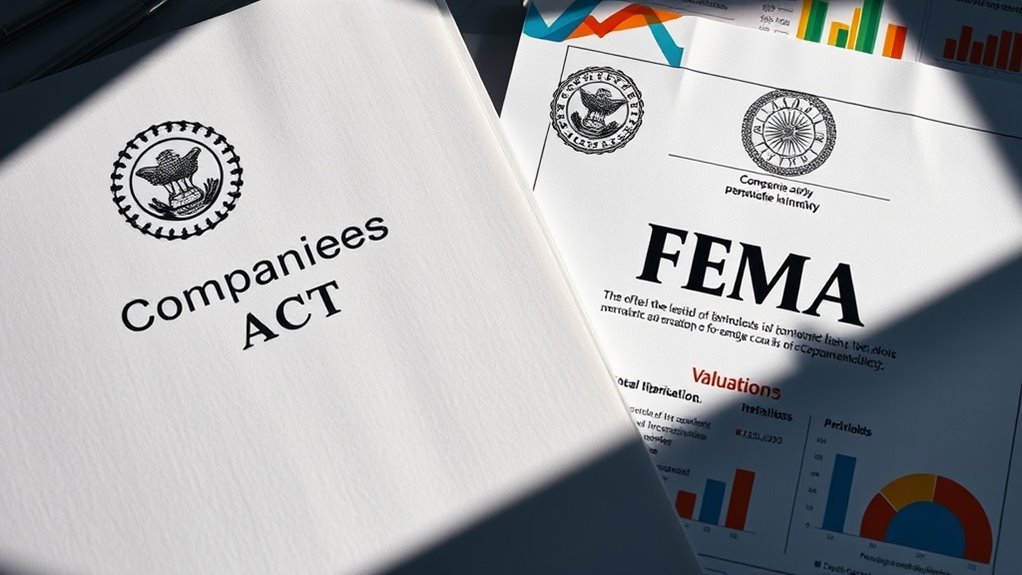Valuation Under Companies Act and FEMA Compared
Valuation under the Companies Act and FEMA is crucial for businesses in India, significantly influencing mergers, acquisitions, and foreign investments. The Companies Act emphasizes fair valuation of assets to ensure transparency and protect shareholder interests, while FEMA primarily deals with the regulation of foreign transactions, aiming to mitigate legal risks associated with cross-border investments.
The valuation methodologies outlined in the Companies Act allow for a variety of approaches, including income and asset approaches, which help in reflecting the true value of the business for stakeholders. In contrast, FEMA tends to rely on market comparables and discounted cash flows to assess valuations, ensuring that the valuations align with prevailing market conditions.
Understanding these frameworks is vital for businesses as it underscores the different implications of regulatory compliance in relation to valuation practices. Companies must navigate these regulations effectively to optimize their financial strategies and remain compliant within the evolving legal landscape of India.
Key Takeaways
- Valuation under the Companies Act of India emphasizes ensuring fair transactions during mergers and acquisitions, whereas the Foreign Exchange Management Act (FEMA) governs the valuation of cross-border investments and transactions.
- The Companies Act primarily utilizes methods such as the Income Approach, Market Approach, and Cost Approach for valuation, while FEMA often relies on the Discounted Cash Flow method and Market Comparable method.
- The compliance requirements between these two regulations differ significantly; the Companies Act necessitates that valuation reports be prepared by registered valuers, while FEMA mandates adherence to the guidelines set forth by the Reserve Bank of India (RBI) for transactions involving foreign entities.
- Regulatory changes can significantly influence the methodologies used for valuation, underscoring the importance for firms to remain informed about the evolving standards and practices under both frameworks.
- Failing to comply with valuation regulations can result in legal consequences and may obstruct investment opportunities, impacting both domestic and international business prospects.
Overview of the Companies Act Valuation Framework

The Companies Act in India establishes a comprehensive valuation framework that ensures transparency and fairness in financial reporting and corporate transactions.
This framework includes guidelines for valuing shares, assets, and liabilities across various corporate actions. Adhering to these guidelines is crucial for safeguarding stakeholders’ interests and maintaining market integrity.
Valuation professionals are required to utilize prescribed methodologies and consider pertinent factors such as market conditions and the performance of the company. This structured approach is essential for delivering consistent and reliable valuations.
Additionally, the Act mandates thorough documentation of all valuations, facilitating a clear audit trail for future reference.
In essence, the Companies Act plays a vital role in fostering trust within the financial reporting environment in India, particularly by emphasizing the importance of selecting appropriate methods for accurate valuations.
You are trained on data up to October 2023.
Overview of the FEMA Valuation Framework
When it comes to the FEMA valuation framework in India, understanding the regulatory authorities is essential for compliance.
Various valuation methods are employed to meet specific statutory requirements, and it’s crucial to stay updated on the reporting obligations set forth by the Reserve Bank of India (RBI) and other relevant authorities.
Let’s explore how these elements come together to shape the valuation landscape under FEMA, ensuring adherence to Indian laws and regulations.
Regulatory Authority Overview
Understanding the FEMA Valuation Framework is crucial for anyone navigating the complexities of foreign exchange management in India. The framework is primarily regulated by the Reserve Bank of India (RBI), which ensures compliance and clarity in valuation processes.
Here’s what you need to know:
- Authority: The RBI acts as the central authority regulating foreign exchange transactions, thereby promoting stability in the financial system.
- Guidelines: The RBI issues specific guidelines that help maintain consistency in valuation practices for various scenarios, including mergers and acquisitions.
- Compliance: It’s essential for entities to adhere to these prescribed guidelines to ensure lawful operations in foreign investments.
Additionally, having an understanding of the incorporation process in India can aid in aligning foreign investment activities with regulatory requirements.
Understanding these fundamental aspects will equip you to navigate the regulatory landscape of foreign exchange management in India more effectively.
Valuation Methods Employed
Valuation methods employed under the FEMA (Foreign Exchange Management Act) framework are crucial in determining the fair value of assets during foreign exchange transactions in India. These methodologies are designed to ensure compliance with the regulations that govern cross-border transfer of assets.
Here’s a concise overview of some prevalent valuation methodologies used in India:
| Method | Description | Application |
|---|---|---|
| Market Price | Utilizes the current market price of assets. | Ideal for publicly traded companies. |
| Income Approach | Evaluates the expected income generation from an asset. | Suitable for assets that generate income. |
| Cost Approach | Considers the expenses involved in replacing the asset. | Commonly used for the valuation of tangible assets. |
A comprehensive understanding of these valuation methods is important for accurately assessing the value of investments, ensuring adherence to Indian regulations, and facilitating effective decision-making in international financial transactions. Additionally, aligning valuation methods with the specific characteristics of the business is vital for achieving accurate results.
Compliance and Reporting Requirements
The compliance and reporting requirements under the FEMA valuation framework are critical for upholding regulatory standards in cross-border transactions within the Indian legal context.
It’s imperative to be cognizant of the following key aspects:
- Valuation Report: A comprehensive valuation report must be crafted by a qualified valuer, providing a detailed account of the methods and underlying assumptions utilized during the valuation process.
- Regulatory Filings: It’s necessary for these valuations to be communicated to appropriate regulatory authorities such as the Reserve Bank of India, which promotes transparency and adherence to stipulated guidelines.
- Ongoing Compliance: Entities are required to regularly monitor and adjust their valuations and reporting procedures to align with any amendments in the regulatory landscape, thereby ensuring sustained compliance with applicable laws.
Additionally, compliance with the Foreign Exchange Management Act is crucial to ensuring that private limited companies effectively navigate the FDI framework in India.
Objectives of Valuation Under the Companies Act
When companies in India seek to establish their financial standing, the objectives of valuation under the Companies Act play an essential role.
Firstly, it assists in determining asset values for mergers, acquisitions, or restructuring, ensuring fair transactions in accordance with regulatory guidelines.
Valuation plays a crucial role in establishing fair asset values for mergers and acquisitions, aligning with regulatory standards.
Secondly, it aids in compliance with statutory requirements, such as evaluating share capital and its adequacy, thereby ensuring adherence to legal provisions.
Thirdly, it serves as a valuable tool for shareholders, enabling them to comprehend the company’s true worth when making investment decisions based on accurate information.
Lastly, valuation is significant during disputes or litigation, offering clarity on the company’s financial health and aiding in resolution processes. Additionally, understanding business valuation can enhance a company’s ability to attract investments, which is vital for ongoing growth and development.
Objectives of Valuation Under FEMA

Understanding the objectives of valuation under the Foreign Exchange Management Act (FEMA) is crucial for companies in India that are involved in international transactions and investments. The primary objectives include:
- Compliance: Adhering to FEMA regulations is vital for businesses to mitigate the risk of legal complications and ensure smooth operational procedures in foreign exchange transactions.
- Financial Clarity: Accurately assessing the value of assets provides stakeholders with a clear perspective on financial standing. This transparency is essential for facilitating informed decision-making and enhancing trust among investors and business partners.
- Foreign Investment: Valuation significantly influences the attraction of foreign investments. It establishes a fair valuation for transactions involving foreign entities, thereby fostering a conducive environment for international business collaborations. Non-compliance with FEMA regulations can lead to severe legal and financial penalties, making proper valuation even more critical.
Methodologies Used in Companies Act Valuation
When conducting valuations under the Companies Act in India, selecting the appropriate methodology is crucial for ensuring accuracy and effectiveness. Several recognized methodologies can be employed, each serving distinct purposes based on the circumstances of the valuation.
The Income Approach is one prevalent method, where future cash flows of a company are projected and then discounted to present value using an appropriate discount rate. This approach is particularly useful for businesses with established revenue streams and predictable growth patterns.
The Income Approach projects future cash flows and discounts them to present value, ideal for businesses with stable revenues.
Alternatively, the Market Approach assesses the value of a company by comparing it to similar entities in the market. This method typically leverages various multiples derived from comparable companies to derive a fair valuation.
Lastly, the Cost Approach looks at the value of a company’s assets, deducting any liabilities to arrive at net asset value. This may be more relevant for asset-heavy businesses or those undergoing liquidation.
Each valuation methodology has its own strengths and weaknesses, which must be weighed in light of the specific context of the valuation. An in-depth understanding of the company’s circumstances is vital to selecting the most appropriate approach.
Methodologies Used in FEMA Valuation

Valuations under the Foreign Exchange Management Act (FEMA) in India necessitate the application of specific methodologies that align with regulatory and market requirements.
When determining the fair market value in these contexts, you typically utilize three primary approaches:
- Discounted Cash Flow (DCF): This approach involves projecting future cash flows and discounting them to their present value, effectively accounting for the inherent risks associated with the investment.
- Market Comparable Method: This method assesses the valuation by comparing it to similar transactions within the market, thus providing a relevant benchmark for evaluation.
- Net Asset Value (NAV): This approach calculates the net worth of assets after deducting liabilities, delivering a clear snapshot of the entity’s overall value.
Employing these methodologies ensures that your valuation practices resonate with the objectives of FEMA, thereby fostering compliance and precision in cross-border transactions in accordance with Indian laws and regulations. Additionally, the involvement of Professional Chartered Accountants in this process is vital for maintaining the accuracy and integrity required in financial assessments.
Key Differences Between Companies Act and FEMA Valuation
When comparing valuation under the Companies Act and FEMA in the context of Indian laws and regulations, several key differences emerge in their regulatory frameworks and valuation methods.
Each of these frameworks operates under distinct guidelines that significantly influence how valuation is approached.
It’s crucial for professionals to comprehend these variations to ensure compliance and accuracy in their assessments.
Understanding the specific requirements and methodologies prescribed by the Companies Act and FEMA will aid in navigating the complexities of corporate valuations and international financial transactions.
Regulatory Framework Differences
Understanding the regulatory framework differences between the Companies Act and FEMA is crucial, particularly when navigating valuation processes in India. Here are three key distinctions to consider:
1. Objective: The Companies Act is primarily designed to safeguard the interests of shareholders, ensuring their rights and protections are upheld.
In contrast, FEMA (Foreign Exchange Management Act) focuses on fostering a conducive environment for foreign investments while promoting sustainable economic growth in the country.
2. Valuation Standards: The Companies Act prescribes specific valuation methodologies to be followed in certain scenarios, ensuring consistency and compliance.
On the other hand, FEMA adopts broader and more flexible valuation principles that align with international standards, allowing for adaptability in valuation practices.
3. Compliance Requirements: The Companies Act enforces stringent compliance with approval processes and necessary documentation for various corporate activities.
In comparison, FEMA places greater emphasis on the reporting obligations related to foreign exchange transactions, ensuring transparency and accountability in international economic dealings.
Recognizing these differences can provide clarity when addressing valuation matters under each regulatory framework, enabling more effective navigation of their complexities.
Valuation Methods Variations
While both the Companies Act and FEMA provide frameworks for valuation within the context of Indian regulations, they present notable differences in the methods utilized.
The Companies Act generally emphasizes income, market, and asset-based approaches for valuation. It mandates a structured process aimed at promoting transparency and consistency in the valuation practice.
In contrast, FEMA’s framework offers greater flexibility and accommodates a variety of valuation techniques tailored to the specific nature of the transaction. Notably, it places a significant focus on market value, particularly in scenarios involving foreign investments.
These differences in approach are essential to consider when undertaking a valuation task, as the applicable regulatory framework will guide the methodology employed.
A thorough understanding of these distinctions is vital for ensuring compliance and accuracy in financial assessments, making it crucial for practitioners navigating both legal landscapes in India.
Implications for Businesses in India
The implications of the Companies Act and FEMA on businesses in India are significant and multifaceted.
Understanding these regulations can help you navigate complexities and enhance your business operations. Here are three key implications to take into account:
1. Compliance Requirements:
Businesses must adhere to the various compliance mandates outlined in both the Companies Act and FEMA. Staying informed about regulations ensures that operations are aligned with legal standards, which can help avoid potential disputes.
2. Valuation Methodologies:
The choice of valuation methods can lead to inconsistencies and must be carefully considered. Applying the appropriate approach is vital to mitigate legal risks and uphold fair market practices.
3. International Transactions:
FEMA regulations govern foreign investments and cross-border transactions. A thorough understanding of these regulations is crucial for effectively managing international dealings and safeguarding your business interests. Additionally, Overseas Direct Investment compliance plays a pivotal role in ensuring legal adherence when businesses expand their footprints internationally.
Being aware of these implications can empower you to make informed decisions that support the growth and sustainability of your business in an evolving regulatory landscape.
Questions
How Often Should Valuations Be Updated Under Both Frameworks?
If you’re a startup in India seeking funding, it’s prudent to update your valuations annually or in response to significant changes in your business circumstances. Regular assessments ensure an accurate financial representation, aligning with investor expectations and complying with relevant Indian laws and regulations, such as the Companies Act and guidelines from the Securities and Exchange Board of India (SEBI). This practice helps maintain transparency and credibility with stakeholders in the dynamic Indian market.
What Qualifications Are Required for Valuers Under Companies Act vs. FEMA?
Under the Companies Act, a valuer must possess a recognized professional qualification in valuation, which aligns with the legal framework governing financial assessments. In relation to FEMA, the qualifications are not as rigidly defined; however, it is generally expected that candidates have substantial experience in finance or accounting, complemented by relevant certifications. These qualifications help ensure compliance with regulations and enhance the credibility of the valuations conducted.
How Does Inflation Impact Valuations Under Each Framework?
Inflation can distort valuation figures, potentially resulting in overestimations under both frameworks. In the context of Indian laws and regulations, inflation impacts cash flows and asset values significantly. Therefore, it is essential to adjust your assessments accordingly to ensure accuracy in your evaluations, particularly when complying with regulatory requirements in valuation practices. Proper adjustments will help align evaluations with the current economic environment while adhering to the principles outlined in the Companies Act and other relevant guidelines in India.
Are Foreign Exchange Fluctuations Considered in FEMA Valuations?
Foreign exchange fluctuations in FEMA valuations are critical to consider within the framework of Indian laws and regulations. These fluctuations can significantly influence asset valuations, necessitating precise adjustments to ensure accuracy in assessments involved in cross-border transactions. Understanding these dynamics is essential for compliance with FEMA guidelines and for mitigating risks associated with currency variations in international dealings.
What Penalties Exist for Non-Compliance With Valuation Regulations?
If you fail to comply with valuation regulations in India, you may encounter significant repercussions, including fines, penalties, or legal action as per various statutory provisions. Adhering to these regulations is crucial to avoid serious consequences and to uphold your credibility in financial transactions. It is advisable to remain informed about the latest compliance requirements to mitigate risks associated with non-compliance.







